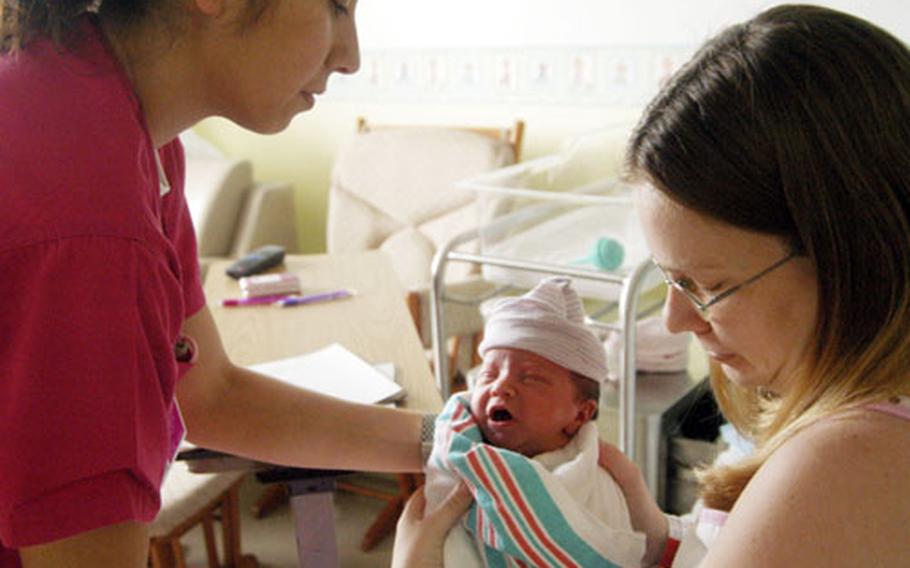
Civilian nurse Crystal Hyatt helps Jennifer Kells with 1-day-old baby Madison at Naval Hospital Yokosuka on Thursday. (Allison Batdorff / Stars and Stripes)
YOKOSUKA NAVAL BASE, Japan — Stocks and storks might have more in common than you think, especially when the birds are flying around doing their folkloric duty of bringing babies. Like the stock market, a bit of magic is required to predict boom and bust cycles as well as the ebbs and flows of baby births.
It’s not an exact science, the labor and delivery staff at U.S. Naval Hospital Yokosuka are quick to point out.
They should know — active-duty women and military spouses from all over Japan come to have babies there, from as far as Sasebo, Iwakuni and Atsugi — and they often arrive in groups.
To keep up, Yokosuka’s staff predicts the numbers of babies to be born in any given month. Amazingly, the numbers they divine are often right on the nose. Last month 63 births were predicted — 62 were born.
Here are some tricks of the timing trade — as told by those in Yokosuka’s baby-birthing business:
Count back nine months from when the Kitty Hawk comes home, says Lt. j.g. Joanna Johnson. She uses a birth wheel to do the math. “Wheel it back nine months and you find the day that the Kitty Hawk Strike Group came back,” Johnson says. Ship movements are the major factor in boom times, concurred the staff.Deployments breed births, says Lt. Cmdr. Evangeline Allen. “When daddies are deployed, they like to leave their own legend behind,” Allen said. “Wartime puts them in a reproductive mood.”Terrorist attacks, like September 11, 2001, are also a factor, said Lt. Suzanne Maroon. “These things are event-based,” Maroon said. “When you have an attack, more people make babies.”Be a storm-watcher, says Lt. j.g. John Hoyos. “It sounds funny, but a woman’s water is more likely to break when there are barometric pressure changes, like with storms,” Hoyos said. In other words, “bad weather brings babies,” agreed Capt. Helen Smith. “We always have more babies born in storms and typhoons here.”Full moons on Friday nights bring babies, Allen said. Added Smith: “You know to avoid [the] labor and delivery [section] on a full moon.”Holiday festivities means more summer babies, Smith said. “Do the math and you find a lot of those August and September babies were made between Thanksgiving and Christmas,” she said. “There’s a lot of ‘Baby, it’s cold outside,’ going on.”Remember always, babies come when they’re ready, noted Smith. “We don’t artificially induce labor to accommodate ship movements, vacations or weddings,” she said. “We still believe that it’s a magic, holy and spiritual thing to have babies pick their own birthdays.”Future predictions: MORE babies, says Allen.
Births show no sign of tapering off at the hospital. To accommodate the numbers of babies anticipated this summer, a reservist nurse was recently activated and renovations are in the works.
“Birth is the most important event in the life of humans," Smith said. “We treat it with reverence, respect, joy and patience. For us, it also means pushing up our sleeves and getting to work.”